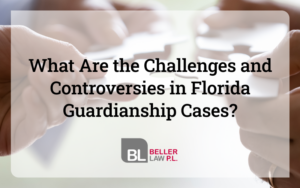
Guardianship involves a court-appointed individual or entity taking legal responsibility for the personal and financial welfare of another—known as the ward. This legal relationship is crucial for meeting the ward’s needs while respecting their rights and dignity. The process is designed to fulfill legal requirements and protect individuals, family dynamics, and the ward’s preferences.
But it can quickly become a complex and contentious process. Dealing with guardianship issues demands a thorough understanding of the law and a tactful and empathetic approach to the varied and often emotional situations that can arise. Seeking representation from an experienced law firm like Beller Law, PL can relieve stress as we help you navigate these complexities.
What Is a Guardianship in Florida?
Guardianship in Florida safeguards individuals—called wards—who cannot manage their affairs due to disabilities or because they are minors. This process, governed by Florida Statutes Chapter 744, assigns a guardian to oversee the ward’s needs. The guardian usually handles the ward’s finances, health care, and living arrangements.
Examples of When a Guardianship Might Be Necessary
Guardianship in Florida is a crucial legal tool for ensuring the safety and well-being of people who cannot care for themselves or manage their affairs. Several circumstances may necessitate establishing a guardianship, including when the ward has any of the following traits or illnesses:
- Age-related incapacity—elderly individuals who have Alzheimer’s disease, dementia, or other age-related cognitive impairments;
- Developmental disabilities—adults with developmental disabilities that impair their ability to make responsible decisions;
- Severe mental illness—individuals with severe mental health issues that prevent them from making informed decisions about their life and health;
- Minor children—minor children who are left without parents due to death or incapacity; and
- Medical incapacity—adults who become incapacitated due to illness or injury who cannot make health care or financial decisions.
Any of the above individuals may need a court to appoint a guardian who can care for their physical and financial needs. Such guardianships play a varied and vital role in protecting the interests of vulnerable people in Florida.
Top Florida Guardianship Challenges and Controversies
While designed to protect vulnerable individuals, establishing a guardianship can lead to challenges and controversies. An estate planning attorney can help families navigate these issues carefully to safeguard everyone’s interests.
Determining Capacity
One of the primary challenges in guardianship matters is determining the potential ward’s capacity to manage their own affairs. Such an evaluation involves nuanced legal and medical knowledge. The evaluation process can become contentious, especially if the potential ward or their family disagrees with the assessment.
Controversies in guardianship cases often revolve around disagreements about capacity. Family members who believe that the person can care for themselves often object to guardianship as a way to protect the potential ward and preserve their autonomy. Disputes may arise over whether the impairment is serious enough to warrant guardianship, and these disputes can lead to complex legal battles.
Family Disagreements
Legal disputes in Florida guardianships can worsen existing family tensions. Family members sometimes argue over who should be appointed guardian, and rising tensions can lead to prolonged conflicts. Each loved one may have very different opinions about the individual’s best interests, and each may believe they are the most suitable guardian. Such disagreements can delay establishing guardianship, thereby leaving the vulnerable person at risk.
Financial Abuse and Exploitation
The level of control that courts often bestow upon guardians provides opportunities for mismanagement or theft. Unfortunately, guardians sometimes abuse their position. Since a guardian often gains control over significant assets, some choose to financially abuse or exploit their ward. Monitoring the guardian’s actions can help ensure they act in the ward’s—and not their own—best interest. Legal systems strive to implement safeguards, but these are not always foolproof.
Right to Counsel and Due Process
The right to legal representation and due process of law in guardianship proceedings is critical because a person’s right to make basic decisions for themselves is on the line. If the ward is truly incapacitated, guardianship is often in their best interests—but abuses can happen if an attorney isn’t there to help protect the ward’s rights and preferences. The legal proceedings must be fair, and an attorney can best represent the potential ward’s voice. In Florida, an appointed guardian is required to have an attorney.
Overreach and Lack of Oversight
Guardianship can sometimes lead to overreaching or overstepping the guardian’s role. This is where guardians begin to exercise more control over the ward’s life than necessary, thereby wrongfully infringing on the ward’s personal freedoms. This is another way that insufficient oversight of guardians can lead to neglect or abuse. Striking a balance between protection and respect for the ward’s independence is a delicate and ongoing challenge.
Implementing thorough oversight mechanisms to review a guardian’s actions and decisions is essential to prevent overreach and safeguard the ward’s interests.
Navigating these challenges requires a comprehensive understanding of guardianship laws and a commitment to ethical and compassionate representation. It is crucial to consult with an experienced estate planning attorney when trying to handle your loved one’s incapacities. You want what is best for them. A skilled lawyer can advocate for their rights and welfare, ensuring that guardianship serves its intended purpose of protection without compromising the ward’s dignity and rights.
Are You Having Florida Guardianship Challenges?
If you are overwhelmed by the thought of navigating the Florida guardianship process on your own, the dedicated team of attorneys at Beller Law, PL, is here to help. We handle guardianship and estate management, as well as probate and family law issues to ensure all your family’s needs are met. We regularly assist clients in Duval, Clay, and St. Johns counties, as well as counties throughout Florida. To learn more about the services we provide and to schedule a consultation with a Florida guardianship lawyer today, give us a call or connect with us through our secure online contact form.
